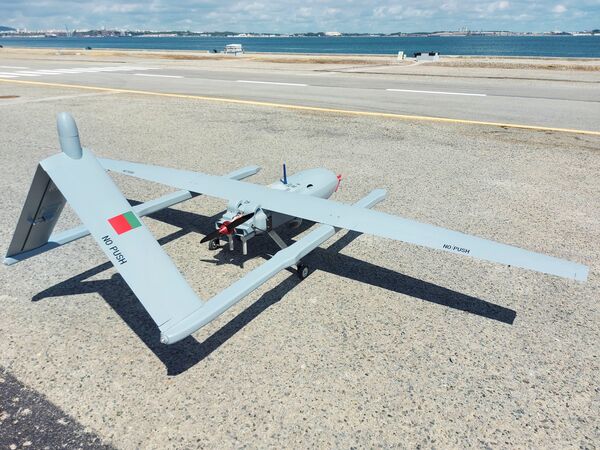- About
- Intara
- Capabilities
- Advisory
- Resources
- News
- Store
27 September 2021
Portugal leads multinational test of unmanned maritime technologies and interoperability
by Victor Barreira


The OGS42 fixed-wing UAV of Portuguese UAVision was fielded to provide situational awareness in support of a range of missions. (Victor Barreira)
Several NATO navies together with the navies of Australia and Brazil, industry, and research organisations have gathered in Portugal to take part in a large-scale experimentation to develop and test operational concepts and requirements, interoperability, technological advances, and new developments in sensors, actuators, command, control, and communications (C3), tactics and procedures on maritime unmanned systems (MUSs) in most maritime operations.
The live exercise (LIVEX) phase of ‘REP(MUS) 21' [Robotic Experimentation Prototyping augmented by Maritime Unmanned Systems] was co-organised by the Portuguese Navy, the University of Porto's Faculty of Engineering, and NATO's Centre for Maritime Research and Experimentation (CMRE) and Maritime Unmanned Systems initiative (MUSI). The LIVEX was conducted from September 13 to 24 over an area of approximately 1,800 sq n miles between Tróia and Sesimbra.
The exercise focused on testing the capabilities of the new generation of MUSs in the three domains – above the water, on the water, and underwater – over a wide range of missions including mine countermeasures (MCM) tactical development and interoperability, over-the-horizon autonomous MCM, anti-submarine warfare (ASW), force protection, harbour protection, multidomain intelligence, surveillance and reconnaissance (ISR), amphibious battlefield preparation, and command-and-control (C2).
Joint C2 command, naval mine-warfare C2 information, and ASW C2 information hubs were established to conduct the operations.
‘REP(MUS) 21' involved 17 navies; 11 ships including the Portuguese NRP Álvares Cabral frigate, NRP Tridente submarine, and NRP Sines and NRP Setúbal patrol vessels, the US Navy's USNS Carson City expeditionary fast transport, and NATO's NRV Alliance research vessel; about 900 personnel; 15 research and development (R&D) entities; one university; eight NATO organisations; and more than 20 companies.
Already a Janes subscriber? Read the full article via the
Client Login
Interested in subscribing, see What we do
Several NATO navies together with the navies of Australia and Brazil, industry, and research organis...
Associated services
 Details
Details 